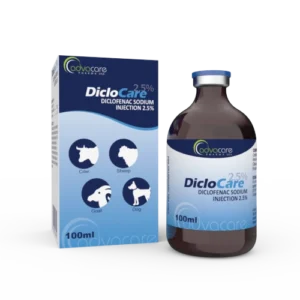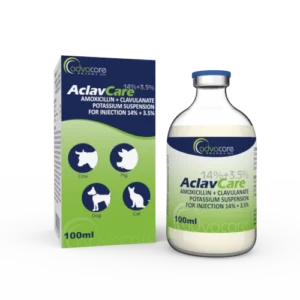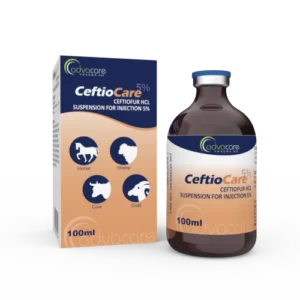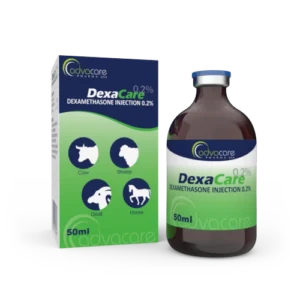What is Ceftriaxone Sodium?
- Antibiotic
- Cow,
- Goat,
- Horse,
- Poultry,
- Sheep,
- Pig
Active Ingredients: Ceftriaxone Sodium
Ceftriaxone Sodium for Injection is an antibiotic used for severe bacterial infections in animals. It is indicated for infections of the lower respiratory tract, skin and skin structures, bone and joint, and urinary tract. It is also used to treat systemic infections like bacterial septicemia and meningitis.
Ceftriaxone belongs to the class of medicines called cephalosporin antibiotics. It works by inhibiting mucopeptide synthesis within the bacteria. Ceftriaxone shows a broad spectrum of activity against both gram-positive and gram-negative bacteria, including Enterobacteriaceae.
This antibiotic is well absorbed in the animal’s body, and the bioavailability is 75-90%, but older animals might have lower bioavailability. The plasma concentrations of the drug peak at around 30 minutes after administration. The antibiotic is then distributed into most body fluids and tissues. This includes kidneys, lungs, joints, soft tissues, bones, pericardial fluid, and biliary tract. The distribution can be lower because the drug remains in the extracellular fluid. Cephalosporins in general have poor penetration into the cerebrospinal fluid, but in higher dosages, antibiotics from the third generation might cross that barrier and reach it. Ceftriaxone belongs to the third group of cephalosporins and is often able to cross the blood-brain barrier which makes this antibiotic suitable for treating bacterial meningitis. The antibiotic gets excreted renally by tubular secretion and glomerular filtration. Biliary elimination is also possible, which is why this drug might not be recommended for animals with kidney or liver diseases. This drug can be used for certain kidney or liver diseases but only under the supervision of a professional.
Ceftriaxone Sodium for Injection is produced and exported by Basil Hygiecare. This medicine is manufactured in one of Basil Hygiecare GMP/ISO-certified factories located in China, India, and the USA.
Why are we a trusted Ceftriaxone manufacturer?
Basil Hygiecare is a leading GMP manufacturer of Ceftriaxone Injection for veterinary use. Our company was established with the aim of providing excellent value to our veterinary distributors by concentrating on competitively priced, high-quality veterinary pharmaceuticals with market-tailored solutions.
Over the past 20 years, Basil Hygiecare has proven to be a trusted Ceftriaxone manufacturer and supplier of 100+ veterinary injections in over 65 countries.
Precautions
Do NOT use Ceftriaxone Sodium for Injection for an animal that: • has a known allergy or hypersensitivity to ceftriaxone or any other cephalosporin antibiotic.
Treatment with this drug should be administered with caution for an animal with:
- hepatic impairment
- malnutrition
- renal insufficiency
Only administer ceftriaxone to pregnant or lactating animals if the benefits outweigh the risks. Consult with a veterinarian before you include this antibiotic.
Long-term treatment with this medicine may cause an overgrowth in non-susceptible microorganisms.
This drug should not be combined with penicillin.
Ceftriaxone is known to interact with drugs like loop diuretics and cefoxitin.
What are the most common animals Ceftriaxone Sodium is used for?
Ceftriaxone Sodium is primarily used for treating bacterial infections in animals and livestock. The specific common uses of Ceftriaxone Sodium include the treatment of bacterial infections in the following:
- respiratory tract
- urinary tract
- locomotor system
- soft-skin tissues
- joint infections
- intra abdominal infections
- gastrointestinal system
Poultry Bacterial Infections
Cephalosporins are approved in some countries for managing early mortality infection in day-old chickens and turkey poultry.
Ruminants (cow, sheep, goat) Bacterial Infections
Ceftriaxone Sodium is an effective antibiotic against many respiratory, skin, gastrointestinal, and urine infections. In ruminants, it is mostly used for treating mastitis, foot rot, and metritis. But it can be used for treating bovine respiratory disease.
Horse Bacterial Infections
This antibiotic has been proven as very effective in horses and can be used for treating many Streptococcus, Staphylococcus, Klebsiella, and Proteus mirabilis. It is effective when an infection is present in different places. This includes respiratory, gastrointestinal, or urinary infections.
Pig Bacterial Infections
In pigs, it can be used for treating respiratory infections caused by gram-negative bacteria. It is also helpful against Pasteurella multocida which can cause a respiratory and systemic infection in pigs. Gastrointestinal infections caused by Salmonella can be managed with this antibiotic.
The antibiotic choice and form of antibiotic depends on the diagnosis from the veterinarian. The veterinarian decides about the prescription of this drug in animals based on the current health condition. In some cases, a combination of other antibiotics and supplements is needed for complete treatment. It can also be used as a prophylactic treatment before surgeries.
Uses
What is Ceftriaxone Sodium used for?
It’s used to treat a wide range of bacterial infections such as:
- respiratory tract infections
- skin and skin structure infections
- urinary tract infections
- bone and joint infections
- bacterial septicaemia
- intra abdominal infections
What animals can be treated with Ceftriaxone Sodium for Injection?
This medicine is recommended for livestock animals such as cows, goats, sheep and pigs. It’s also used for poultry and horses.
How is Ceftriaxone Sodium for Injection used?
This drug has been manufactured as a powder for reconstitution. It should be dissolved with sterile water. The reconstituted solution should be used as soon as possible.
How can Ceftriaxone Sodium help animals?
This antibiotic is suitable for production animals. It is used for treating bovine respiratory diseases due to Pasteurella spp. And urinary tract infections. It can also be used for treating soft-tissue infections and bone and joint infections. Ceftriaxone is also used for surgical prophylaxis 1 hour before surgery. This group of antibiotics penetrates into tissues and fluids sufficiently, except in cerebrospinal fluid, which makes it a good antibiotic for treating osteomyelitis, prostatitis, and arthritis. Bronchopneumonia caused by Mannheimia haemolytica or Pasteurella multocida can also be treated with this drug, especially in cattle. It can also be used for treating urinary infections in dogs. This drug is also approved in various countries for early mortality infections in day-old chickens and turkey poultry.
It can help in treating mastitis, metritis, foot rot, skin infections, pneumonia, etc. This antibiotic can be used for many diseases and can provide efficient treatment if administered according to the antibiogram and appropriate dosage regimen prescribed by a healthcare professional.
How can Ceftriaxone Sodium help in treating bovine respiratory disease?
This disease is one of the most costly diseases of beef cattle in North America. It can be caused by Mannheimia haemolytica, Pasteurella multocida, Histophilus somni, and Mycoplasma bovis. This antibiotic has bactericidal properties and can lead to fast recovery.
How is Ceftriaxone Sodium administered in animals?
There are 3 main ways of administering Ceftriaxone injections in animals, and this includes subcutaneous, intramuscular, and intravenous injections. The choice of administration depends on the veterinarian. However, intramuscular injections can be painful for the animal, while intravenous administration can lead to local phlebitis. No matter the way of administration, the plasma concentrations peak at around 30 minutes after injection. When administering, make sure to provide aseptic and sterile conditions. Clean the animals’ coat if it is dirty when applying. Swab it with a high-quality skin antiseptic such as benzalkonium chloride in 70% alcohol, and never apply it to dirty or infected skin.
This antibiotic is not effective for treating E.coli, Pseudomonas, or other problematic coliforms.
Is only Ceftriaxone Sodium enough for treating infections in animals?
If the results from the antibiogram show that this is the most suitable antibiotic and that the bacteria is not resistant to it, then it might be enough for the treatment process. However, during the treatment of some diseases, some additional supplements and drugs might be needed. If there are some secondary diseases present, the treatment might become more complicated.
How should Ceftriaxone Sodium for Injection be stored?
This medication should be stored in a dark, dry location under 30°C.
What are the withdrawal times for Ceftriaxone Sodium for Injection?
For cattle, the reported withdrawal time is 0-3 days for milk and 4-13 days for meat. The time of withdrawal depends on the country’s regulatory requirements. It must be followed to prevent food residues and consequent public health implications.
How much Ceftriaxone Sodium should be given to large animals?
The usual dose is 15-50mg per kg of body weight.
The dosage depends on the current health condition of the animal and the antibiogram. When calculating the dosage, take into consideration the drug’s properties, animal species, weight, and health status. This drug should be used only as advised by the veterinarian.
Dosage
How much Ceftriaxone Sodium should be given to large animals?
The usual dose is 15-50mg per kg of body weight.
The dosage depends on the current health condition of the animal and the antibiogram. When calculating the dosage, take into consideration the drug’s properties, animal species, weight, and health status. This drug should be used only as advised by the veterinarian.
Refer to a veterinary doctor or pharmacist for guidelines on dosage.
Side Effects
As with all pharmaceuticals, some unwanted effects can occur from the use of Ceftriaxone Sodium for Injection.
Some common side effects may include but are not limited to:
- temporary elevation of BUN (blood/urea/nitrogen) and serum creatinine
- hypersensitivity responses
- pruritus
- gastrointestinal effects
Intramuscular application might be painful for the animal, while intravenous administration can lead to local phlebitis. The most common side effects are gastrointestinal changes like diarrhea, vomiting, nausea, constipation, or stomach upset.
There are some rare cases of reported antimicrobial-induced colitis due to gastrointestinal side effects.
Improper usage of this antibiotic can lead to superinfections and pathogens like Pseudomonas or Candida spp.
Some unwanted side effects can be seen if this drug is combined with Penicillin.
For a comprehensive list of all possible side effects of this medication, consult a veterinarian.







